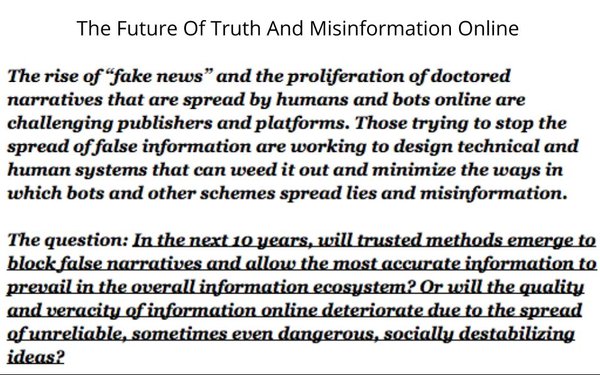Report Finds Experts Split On Digital's Role In A Post-Post-Truth World
- by Joe Mandese @mp_joemandese, October 19, 2017

An exhaustive study of more than 1,000 experts finds they are split over the impact that digital media will have on society’s consensus of truth. The report, “The Future of Truth and Misinformation Online,” released this morning by the Pew Research Center, opens with the fact that the Oxford Dictionaries declared “post-truth” as the word of the year for 2016, defining it as “relating to or denoting circumstances in which objective facts are less influential in shaping public opinion than appeals to emotion and personal belief.”
The study interviewed more than 1,100 internet and technology experts over the summer on their views about whether “trusted methods” will emerge over the next 10 years to “block false narratives and allow the most accurate information to prevail in the overall information ecosystem?”
advertisement
advertisement
The consensus was a glass half-empty view, with 51% projecting the information environment will not improve, while 49% expect it to get better.
“Both camps of experts share the view that the current environment allows 'fake news' and weaponized narratives to flourish, but there is nothing resembling consensus about whether this problem can be successfully addressed in the coming decade,” Lee Rainie, Pew Research Center’s director of internet and technology research, said in a statement highlighting results of the report. “They disagree about which side comes out on top in the escalating arms race: those who exploit human vulnerabilities with internet-speed manipulation tactics or those who create accurate information and reliable delivery systems for it.”
A key issue influencing the future is an economic one, according to the report’s co-author Janna Anderson, director of Elon University’s Imagining the Internet Center, who noted the information “environment can’t be improved without more well-staffed, financially stable, independent news organizations whose signals are able to rise above the noise of misinformation to create a base of 'common knowledge’ for the public.”
The second key finding urged the need for greater media literacy in society so that individuals are better equipped at differentiating “fact from falsehood.”
The 500 page report can be accessed here, but the top lines include:
• | The information environment will not improve and human nature is to blame. Respondents supporting this theme say humans tend to be selfish, tribal, gullible, convenience seekers. They worry that today’s powerful information actors have an incentive to keep the status quo. And they think the future will be organized around social divisions, with a segment of population finding high-quality information, while “chaos will reign” for those who cannot afford or discern reliable information or show no interest in getting it. |
• | The information environment will not improve because technology will create new challenges that can’t or won’t be countered effectively and at scale. These responses often described the bad actors as having a leg up on those seeking to combat misinformation. They expect that weaponized narratives and false information will be magnified by social media, online filter bubbles, bots and artificial intelligence. |
• | The information environment will improve because technology will help label, filter or ban misinformation and thus upgrade the public’s ability to judge the quality and veracity of content.Those who think there will be improvements predict that the use of algorithmic filters, browsers, apps and plug-ins will diminish the potency and availability of misinformation. They think “assessability” schemes and “trust ratings” will help, too. Some say regulation will also play a part in curbing misinformation. |
• | The information environment will improve because people will adjust and make things better. Some of these experts argue that misinformation is nothing new and society has always found a way to lessen its impact. They say as people become more skilled in sorting fact from fiction, the information environment will improve. Some expect crowdsourcing will play a prominent role in verifying facts by blocking those who propagate lies and propaganda. Some also showed support for distributed ledgers (blockchain). |
• | A fifth theme: Experts in both camps who said technology alone can’t put a dent in the influence of misinformation urged two strategies to combat it: Tech can’t win the battle. The public must fund and support the production of objective, accurate information. It must also elevate information literacy to be a primary goal of education. |



I believe the experts fail to recognize the volume and voloitcy of social, the likes the world has never experienced. Most of what is published on social is opinion only with no valadition.
@Larry Wilken: I think they think the problem is that many social media users may not know the difference.